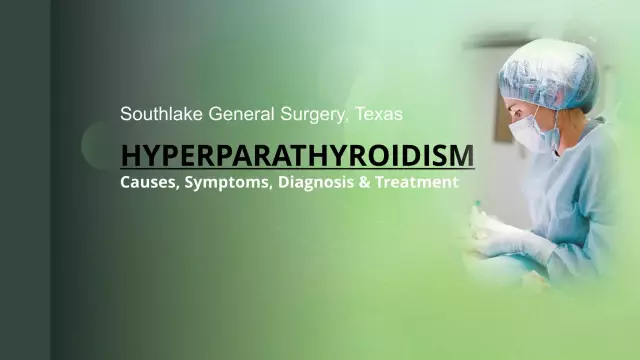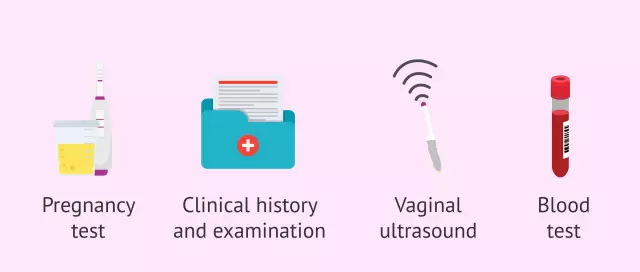- Author Rachel Wainwright wainwright@abchealthonline.com.
- Public 2023-12-15 07:39.
- Last modified 2025-11-02 20:14.
Hyperparathyroidism
General characteristics of the disease

Hyperparathyroidism (aka hyperparathyroidism) is an endocrinological disease in which an increased secretion of parathyroid hormones occurs in the human body. As a result, the amount of calcium in the skeletal system increases, and hypercalcemia syndrome develops. This reduces bone strength and increases the likelihood of bone fractures.
For a long time, hyperparathyroidism was considered a fairly rare disease. However, thanks to the modern level of medical technology, it was possible to find out that only hyperparathyroidism with a significant excess of parathyroid hormones is a rare pathology.
The disease of mild severity occurs on average in one in 500 people. Diagnosis of hyperparathyroidism often occurs during a routine physical.
The disease can be primary or secondary.
Primary hyperparathyroidism
The cause of the development of primary hyperparathyroidism in 85% of cases is the parathyroid adenoma. A single form of a tumor is usually called a solitary parathyroma. Much less often, multiple benign tumors or malignant neoplasms of the parathyroid glands lead to primary hyperparathyroidism. Another possible cause of primary hyperparathyroidism is hyperplasia of the parathyroid glands.
Overproduction of parathyroid hormones causes excessive excretion of phosphates by the kidneys, accelerates the absorption of calcium in the intestine and disrupts metabolic processes in bone tissue. In primary hyperparathyroidism, the rate of resorption (destruction) of bone tissue exceeds the rate of bone formation.
As a result, a patient with hyperparathyroidism develops generalized osteoporosis (thinning and deformity of bones), osteodystrophy (accelerated destruction of bones).
Complications of primary hyperparathyroidism include damage to the tissues of the renal tubules and nephrocalcinosis (formation of kidney stones). Large amounts of calcium in urine significantly reduce the patient's kidney function.
Other common complications of primary hyperparathyroidism include:
- calcification of blood vessels,
- increased blood pressure,
- ulcerative lesions of the intestine,
- left ventricular hypertrophy,
- valvular and coronary calcifications (salt deposits in the heart).
Secondary hyperparathyroidism
The development of secondary hyperparathyroidism is caused by an attempt by the body to compensate for hypocalcemia (calcium deficiency in the body) or hyperphosphatemia (excess of phosphates).
The main causes of secondary hyperparathyroidism are kidney and gastrointestinal diseases. For instance:
- renal rickets,
- chronic renal failure,
- primary tubulopathy (impaired transport of substances in the membranes of the renal canal),
- malabsorption syndrome (poor absorption of the small intestine).
Bone pathologies and fermentopathies in genetic or systemic autoimmune diseases can also lead to secondary hyperparathyroidism.
Another possible provocateur of secondary hyperparathyroidism is malignant neoplasms in the bone marrow (myeloma).
Hyperparathyroidism symptoms
The disease is characterized by a complete absence of symptoms at the initial stage of development. Diagnosis of hyperparathyroidism at this stage is possible only on the basis of the detected hypercalcemia.
Renal symptoms of hyperparathyroidism include:
- polyuria (increased urine secretion),
- polydipsia (severe thirst syndrome),
- nephrolithiasis (kidney stones),
- frequent cases of pyelonephritis (inflammation of the kidneys).

A symptom of severe hyperparathyroidism is the development of renal failure.
Bone symptoms of hyperparathyroidism are:
- frequent fractures
- osteoporosis,
- chondrocalcinosis (destruction of the cartilage tissue of the joints).
Gastrointestinal symptoms of hyperparathyroidism:
- anorexia (lack of appetite),
- flatulence,
- nausea,
- peptic ulcer of the duodenum and stomach,
- pancreatitis (inflammation of the pancreas)
- pancreacalculosis (stones in the pancreas).
With a long course of the disease, cardiovascular symptoms of hyperparathyroidism and central nervous system disorders appear:
- arterial hypertension,
- depression,
- increased excitability or drowsiness,
- confusion of consciousness.
In the secondary form of the disease, the symptoms are not hyperparathyroidism, but the underlying disease, as a rule, of renal or gastrointestinal etiology.
The most severe complication of primary or secondary hyperparathyroidism is hypercalcemic crisis. A patient with blood plasma calcium levels above 4 mmol / l sharply increases weakness, drowsiness, dehydration, fever, and then develops a coma.
Diagnosis of hyperparathyroidism
Hypercalcemia, the main symptom of hyperparathyroidism, is diagnosed with a routine biochemical blood test. In the diagnosis of hyperparathyroidism, it is also important to simultaneously detect in the patient's blood a deficiency of phosphates and elevated levels of phosphoric acid salts, alkaline phosphatase, the amino acid hydroxyproline, and also cyclic AMP (cyclic adenosine monophosphate).
To assess the function of the parathyroid glands in the diagnosis of hyperparathyroidism, the level of parathyroid hormones in the blood is checked.
Instrumental methods for diagnosing hyperparathyroidism include ultrasound, MRI and CT of the mediastinum and neck region, and bone X-ray. The osteodensitometry procedure measures bone density. Thanks to the use of ECG in the diagnosis of hyperparathyroidism, cardiac complications of the disease are determined.
Genetic diagnosis of hyperparathyroidism is used in familial forms of hypercalcemia.
Hyperparathyroidism treatment
Primary hyperparathyroidism is a slowly progressive disease. With hypercalcemia below 3 mmol / L, hyperparathyroidism is usually not treated. The patient needs only dynamic observation.
Conservative treatment of hyperparathyroidism is limited to the elimination of the state of hypercalcemia. For this, the patient is recommended to drink plenty of fluids in uncomplicated cases. In an emergency, in the conservative treatment of hyperparathyroidism, diuretics and intravenous sodium chloride are used to increase the volume of circulating blood.

In addition, a patient with symptoms of primary or secondary hyperparathyroidism may be prescribed courses of bisphosphonates. These drugs slow down bone breakdown and normalize calcium levels in the body. However, they may have some side effects: muscle pain, fever, and high blood creatinine levels.
The effect of using calcimimetics in the treatment of hyperparathyroidism is still not well understood.
A radical method of treating hyperparathyroidism is a surgical operation for tumors of the parathyroid glands. After removal of the parathyroma, a course of conservative therapy is carried out to eliminate the state of hypercalcemia.
The absolute indications for surgical treatment of hyperparathyroidism are:
- single tumor of the parathyroid glands,
- the young age of the patient,
- high degree of hypercalcemia,
- renal dysfunction,
- significant decrease in bone mass.
Possible methods of surgical treatment for hyperparathyroidism are subtotal or total parathyroidectomy. In the first case, only 50-70 g of the least altered tissues of the parathyroid glands are not removed.
The efficiency of surgical treatment of hyperparathyroidism is more than 97%. A relapse of the disease is possible only with genetic forms of hypercalcemia syndrome.
YouTube video related to the article:
The information is generalized and provided for informational purposes only. At the first sign of illness, see your doctor. Self-medication is hazardous to health!






